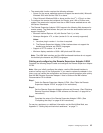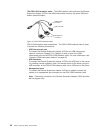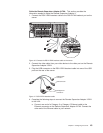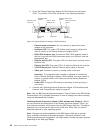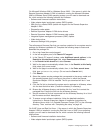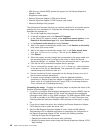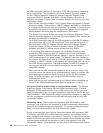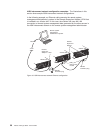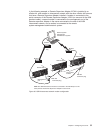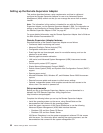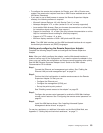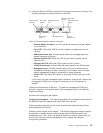resources,
enabling
Remote
Supervisor
Adapters,
ASM
processors,
ASM
PCI
adapters,
and
ISMPs
on
the
ASM
interconnect
network
to
send
alerts
using
a
modem
or
the
network,
even
if
they
do
not
have
a
modem
or
network
connection
physically
attached.
Note:
ISMPs
can
use
the
communications
resources
of
a
Remote
Supervisor
Adapter,
Remote
Supervisor
Adapter
II-EXA,
or
Remote
Supervisor
Adapter
II
only.
When
alerts
are
generated,
they
are
forwarded
to
the
Remote
Supervisor
Adapter
II-EXA,
Remote
Supervisor
Adapter
II,
Remote
Supervisor
Adapter,
ASM
processor,
or
ASM
PCI
adapter
on
the
ASM
interconnect
network
that
has
the
communication
resources
to
forward
the
alert.
If
no
system
on
the
ASM
interconnect
network
meets
the
requirements,
the
alert
is
set
for
transmission
if
the
connection
type
is
configured
or
becomes
available
later.
If
multiple
modems
or
network
connections
exist
in
the
ASM
interconnect
network,
you
cannot
specify
which
system
will
receive
an
alert
or
which
will
use
its
modem
or
network
connection
to
forward
the
alert.
If
an
alert
is
forwarded
to
a
Remote
Supervisor
Adapter
II-EXA,
Remote
Supervisor
Adapter
II,
Remote
Supervisor
Adapter,
ASM
processor,
or
ASM
PCI
adapter
that
is
unable
to
deliver
the
alert
(for
example,
the
modem
it
is
configured
to
use
has
failed
or
the
network
cannot
resolve
the
destination
IP
address),
the
processor
or
adapter
attempts
to
forward
the
alert
to
another
system
on
the
ASM
interconnect
network
that
has
the
communication
resources
to
forward
the
alert.
Alerts
are
typically
sent
only
once
(per
connection
type),
but
an
alert
is
forwarded
to
another
interconnect
device
if
the
resources
exist
on
other
interconnect
devices
in
the
network.
For
example,
on
a
three
ASM
processor
network
where
ASM
processor
1
generates
a
modem
alert,
but
does
not
have
a
modem
and
the
two
other
ASM
servers
with
ASM
processors
have
modems
connected
to
them,
the
following
might
occur:
If
ASM
processor
1
generates
an
alert
and
the
modem
is
unplugged
from
ASM
processor
2
45
seconds
or
less
prior
to
ASM
processor
1
generating
the
alert,
ASM
processor
1
forwards
the
alert
to
ASM
processor
2
having
previously
determined
that
ASM
processor
2
had
an
available
modem
(which
is
now
no
longer
available).
When
ASM
processor
2
receives
the
forwarded
alert,
knowing
its
modem
is
not
available,
it
determines
that
a
modem
is
attached
to
ASM
processor
3,
and
forwards
the
alert
to
ASM
processor
3.
Therefore,
depending
upon
the
time
frame
(45
seconds)
within
which
a
resource
(modem)
fails,
the
alert
might
be
forwarded
multiple
times
until
a
device
on
the
interconnect
network
can
send
the
alert.
Chapter
2.
Configuring
the
server
49



